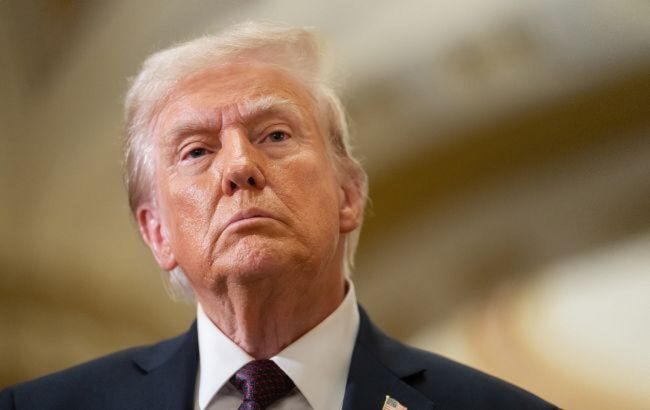Trump ready to back hellish Russia sanctions but with catch
 Photo: Donald Trump, President of the United States (Getty Images)
Photo: Donald Trump, President of the United States (Getty Images)
US President Donald Trump is reportedly ready to sign off on a bill imposing tough sanctions on Russia. However, he also wants the power to personally decide the future of those restrictions, according to Politico.
According to a senior US administration official, "conceptually there’s an openness" to the bill proposed by Republican Senator Lindsey Graham. However, the White House insists that the document must preserve the exclusive powers of the president in matters of foreign policy.
The current version of the bill provides that the president may delay for up to 180 days the application of a 500% customs tariff for countries purchasing Russian oil and uranium. Senator Graham stated that he agreed to revise the document to allow a second waiver under congressional oversight.
What Trump wants
The changes insisted upon by the administration aim to secure the president’s authority to grant such exemptions, preventing congressional interference if Trump decides to lift the sanctions.
A White House representative told Politico that the current version of the bill allows for the president’s foreign policy decisions to be subject to micromanagement by Congress through the adoption of a joint resolution of disapproval.
"That’s a nonstarter for us," said the official. "The administration is not going to be micromanaged by Congress on the president’s foreign policy. The bill needs a waiver authority that is complete."
The publication reminded that Trump’s new stance on the sanctions bill is due to his growing frustration with Vladimir Putin’s policies, who has rejected the US president’s efforts to halt hostilities in Ukraine.
"For the president now, he has invested his own reputation of being able to negotiate anything anywhere, and Putin has made him look foolish," said one Republican operative close to the White House.
Senate Republican Majority Leader John Thune is taking a more cautious tone: he acknowledges "substantial progress" in cooperation with the White House on the bill, but also emphasizes the need for Trump’s full support.
In his Senate speech on Wednesday, he noted that the bill could theoretically be brought to the floor later this month, but offered no guarantees.
But the president’s comments, emphasizing that any additional Russia sanctions would be "at my option," underlined what aides said is a top priority: maintaining maximum flexibility and total control over US policy toward the Kremlin.
Talks still ongoing
Two people familiar with the closed-door discussions on Capitol Hill said that while the White House generally supports the bill, the scope of presidential powers over exemptions is still under negotiation. Senator Thune confirmed that this issue remains on the table.
When asked about the status of the negotiations, the White House referred to Trump’s recent statements.
The Republican-controlled Congress generally supports the Trump administration. Last week, it passed a major tax and budget package and backed the White House’s actions in the areas of trade, immigration, and military powers. All of these issues also fall under the authority of Congress, according to the US Constitution.
Given this trend, the administration expects that the final version of the sanctions bill will be drafted in a way that meets Trump’s demands, even if that means reducing Congress’s role in its implementation.
This would mark a shift from the approach used during Trump’s first term, when Russia sanctions legislation included a review procedure by Congress.
Breakthrough in talks with Putin
In addition to the desire to limit Congress’s ability to influence foreign policy, the president’s push to retain flexibility is also linked to his aim of leaving room for a potential breakthrough in negotiations with Putin, White House officials say.
Graham reiterated Wednesday that he believes Trump is on board with his legislation, saying that the president "wants a waiver, he’s got a waiver. He’s in control of how you implement the sanctions."
"He told me he thought it would be helpful," Graham said about his conversations with Trump about the bill. "We want to be a team. We want to help the president. This is an effort to give the president leverage he doesn’t have today."
Republicans waiting for Trump's signal
More than 80 senators from the Republican and Democratic parties have already signed the bill, potentially making it veto-proof. However, many Republicans are hesitant to move forward without Trump’s clear backing.
"The desire to move up here is real, but the risk is moving a bill that the president ultimately decides he doesn’t want," said one GOP Hill official granted anonymity to discuss the private deliberations.
Senate consideration is tentatively scheduled for the week beginning July 21. At the same time, some Republican lawmakers remain skeptical of Graham’s assurances of full agreement. They want to hear the president’s support personally.
This is especially true for members of the "America First" faction in the Republican Party, who have often criticized Graham’s more traditional hardline approach.
For example, Republican Senator Josh Hawley said he plans to call Trump directly to learn his position.
"I know Lindsey has said now he’s in favor of it … [but] I just want to get clued into what his thinking on it,” Hawley said. "I just prefer to hear it from him."
Another Republican senator, speaking on condition of anonymity, stated: "If the president supports the sanctions, I support them too," stressing his trust in the president.
"He’s the one in the middle of all the negotiations," the senator continued. "He’s frustrated with Putin today. He’s been frustrated with [Ukrainian President Volodymyr] Zelenskyy before. And he’s the only leader in the world that can bring both sides together."
Trump's shifting approach to Russia
In recent days, US President Donald Trump has spoken about a shift in his attitude toward Vladimir Putin after a series of massive strikes on Ukraine.
On Tuesday, July 8, Donald Trump stated that Putin was “very nice, but it is meaningless” and that he is "very seriously considering" the sanctions bill proposed by Graham.
The bill provides for the imposition of 500% import duties on countries that purchase Russian oil, gasoline, or petrochemicals.
The head of the White House also promised Putin a "surprise."
On Wednesday, House Speaker Mike Johnson expressed his support for the initiative. He said Putin has shown an unwillingness to engage in constructive negotiations for a peaceful resolution and "we need to send him a message."

